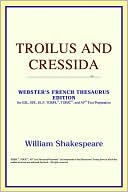

 |

|

The average rating for Troilus and Cressida based on 2 reviews is 3.5 stars.
Review # 1 was written on 2007-06-09 00:00:00 Jennifer Boyce Jennifer BoyceWhen I was young and naive, I loved Troilus and Cressida for its brave cynicism, but now that I am older--and my outlook is bleaker--I appreciate it for its realism and compassion. Shakespeare shows us a world in which lovers yearn to be true and warriors strive to be brave, but both inevitably fail, betrayed by human nature and the adventitious provocations of time. Here, as in Romeo and Juliet, passion and violence are inextricably linked. Indeed, this later play often seems to be a dark parody of the earlier, with Pandarus--a debased version of both Nurse and Friar--pimping the two young lovers, and the final "tragedy" resolving itself in the death--not of two brave lovers--but of love and bravery themselves. |
Review # 2 was written on 2009-06-04 00:00:00 Mathew Ziccarelli Mathew ZiccarelliIt's a timeless story, really: sensitive young guy gets carried away by the noble delirium of first love and goes all mushy over the dirty ho who punched his v-card. Complications ensue. If you think my synopsis sounds crude, all I can say is, don't read Troilus and Cressida, because it gets a whole lot cruder than that. For sheer nastiness, it's right up there with that other Shakespearean shocker, Titus Andronicus (though without the multiple amputations and cannibalism). Taking over the creaking narrative machinery of the Trojan epic, Shakespeare reengineers it for a cynical contemporary audience (scholars think the play was first performed at the Inns of Court, and there's no reason to believe that the legal profession back then was any more distinguished for its warm and fuzzy idealism than it is now). As part of his programmatic revisionism, he gives us, in place of Chaucer's 'flower of chivalry', an ugly collection of losers, liars and mad-dogs. Thus, in Shakespeare's hands, Troilus becomes a romantic idiot, Cressida a whore, Achilles a mincing prima donna, Ajax a dumb jock eaten up with vanity, and on and on. The only character not affected by the deflationary pressure of Shakespeare's irony is poor, doomed Hector, who fights bravely and honourably in a lost cause, and ends up getting his carcass dragged around the walls of Troy by a gloating Achilles (who, in the play's most flagrant departure from the original, had sicked his Myrmidons on the unarmed Trojan). You could argue that this sceptical 'reading' of the case is already implicit in Homer, but it's astonishing how far Shakespeare takes it, how complete the satirical inversion is. It's as if he chose his source material only for the pleasure of hurling excrement at it, which he does with all the unseemly gusto of a troubled child flinging poo-poo around the sandbox. And it's not only the characters who get taken down a peg or two; Shakespeare's satire goes much deeper than a mere lampooning of types. In Troilus and Cressida, perennial human values like love, justice and honour are shown to be grotesque shams - the smiling PR flunkies of the superego, employed to cover up appalling violence and sexual misconduct. 'Lechery, lechery!' says Thersites, the licensed cynic of the play: 'Still wars and lechery! Nothing else holds fashion.' When I first read Troilus and Cressida years ago, this vein of exuberant nihilism appealed to my teenage misanthropy. Naïve and inexperienced though I was, I nevertheless cherished a second-hand (and thoroughly ridiculous) self-image as a disillusioned man of the world, and I suspect that works like Troilus and Cressida helped me maintain this pose well beyond the stage of late adolescence to which it properly belonged. But it's weird: now that I'm a little older, and have actually been deprived of a few illusions, the bitter, ranting tone of Troilus and Cressida - while still amusing in its way - makes me slightly uneasy. Maybe it's a defensive reaction on my part, but I feel that such pessimism offers only a partial, occluded view of things. The whole 'the world is shit so please excuse me while I drink myself to death' philosophy of life is so seductive because it's obviously justified by the evidence. But just because it's true doesn't mean it's correct, if you get the distinction. Returning to the play, though, I'd suggest that the failure of Troilus and Cressida - both as drama and as philosophy - is 'inscribed' within the tragicomic mode itself. By rights, tragicomedy - of which Waiting for Godot would be a modern example - ought to be the most complete, the most realistic form of drama, because it's able to accommodate things that pure tragedy and comedy have to keep out. In practice, however, it tends to be curiously sterile and negative, incapable of affirming anything beyond its own grandiloquent world-weariness. Tragedy says: 'The good man is destroyed by an indifferent universe' (true). Comedy says: 'The good man gets married' (also true). Tragicomedy just says, with cheerful bad faith: 'Let's hang ourselves immediately' - and goes on telling jokes. |
CAN'T FIND WHAT YOU'RE LOOKING FOR? CLICK HERE!!!